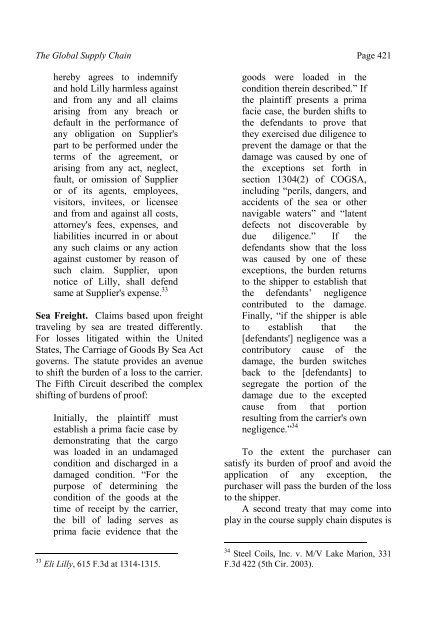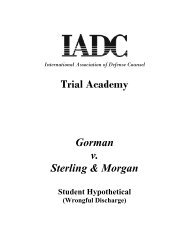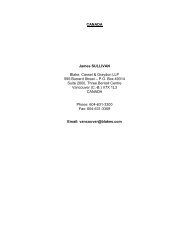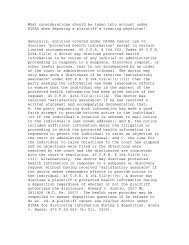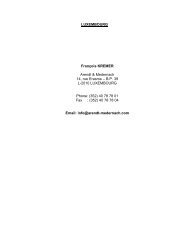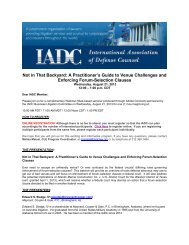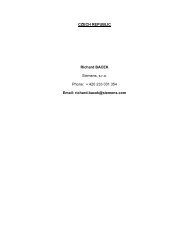Defense Counsel Journal - International Association of Defense ...
Defense Counsel Journal - International Association of Defense ...
Defense Counsel Journal - International Association of Defense ...
You also want an ePaper? Increase the reach of your titles
YUMPU automatically turns print PDFs into web optimized ePapers that Google loves.
The Global Supply Chain Page 421hereby agrees to indemnifyand hold Lilly harmless againstand from any and all claimsarising from any breach ordefault in the performance <strong>of</strong>any obligation on Supplier'spart to be performed under theterms <strong>of</strong> the agreement, orarising from any act, neglect,fault, or omission <strong>of</strong> Supplieror <strong>of</strong> its agents, employees,visitors, invitees, or licenseeand from and against all costs,attorney's fees, expenses, andliabilities incurred in or aboutany such claims or any actionagainst customer by reason <strong>of</strong>such claim. Supplier, uponnotice <strong>of</strong> Lilly, shall defendsame at Supplier's expense. 33Sea Freight. Claims based upon freighttraveling by sea are treated differently.For losses litigated within the UnitedStates, The Carriage <strong>of</strong> Goods By Sea Actgoverns. The statute provides an avenueto shift the burden <strong>of</strong> a loss to the carrier.The Fifth Circuit described the complexshifting <strong>of</strong> burdens <strong>of</strong> pro<strong>of</strong>:Initially, the plaintiff mustestablish a prima facie case bydemonstrating that the cargowas loaded in an undamagedcondition and discharged in adamaged condition. “For thepurpose <strong>of</strong> determining thecondition <strong>of</strong> the goods at thetime <strong>of</strong> receipt by the carrier,the bill <strong>of</strong> lading serves asprima facie evidence that the33 Eli Lilly, 615 F.3d at 1314-1315.goods were loaded in thecondition therein described.” Ifthe plaintiff presents a primafacie case, the burden shifts tothe defendants to prove thatthey exercised due diligence toprevent the damage or that thedamage was caused by one <strong>of</strong>the exceptions set forth insection 1304(2) <strong>of</strong> COGSA,including “perils, dangers, andaccidents <strong>of</strong> the sea or othernavigable waters” and “latentdefects not discoverable bydue diligence.” If thedefendants show that the losswas caused by one <strong>of</strong> theseexceptions, the burden returnsto the shipper to establish thatthe defendants’ negligencecontributed to the damage.Finally, “if the shipper is ableto establish that the[defendants'] negligence was acontributory cause <strong>of</strong> thedamage, the burden switchesback to the [defendants] tosegregate the portion <strong>of</strong> thedamage due to the exceptedcause from that portionresulting from the carrier's ownnegligence.” 34To the extent the purchaser cansatisfy its burden <strong>of</strong> pro<strong>of</strong> and avoid theapplication <strong>of</strong> any exception, thepurchaser will pass the burden <strong>of</strong> the lossto the shipper.A second treaty that may come intoplay in the course supply chain disputes is34 Steel Coils, Inc. v. M/V Lake Marion, 331F.3d 422 (5th Cir. 2003).


